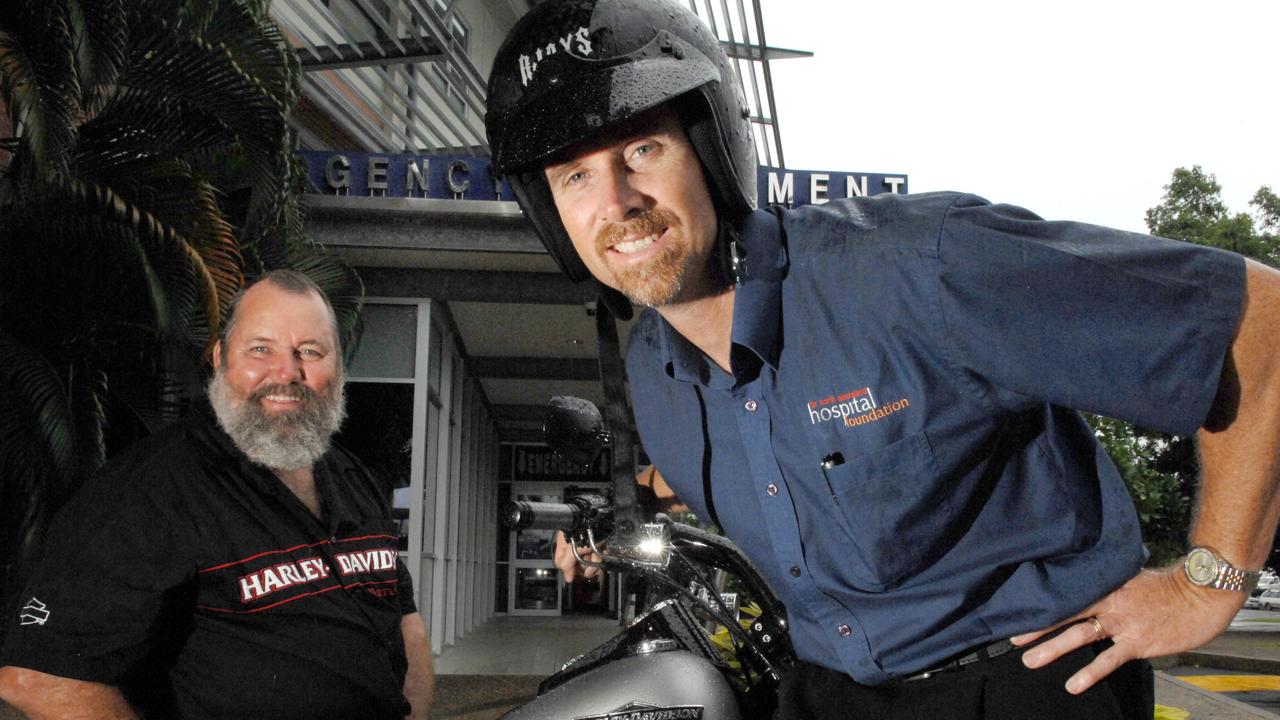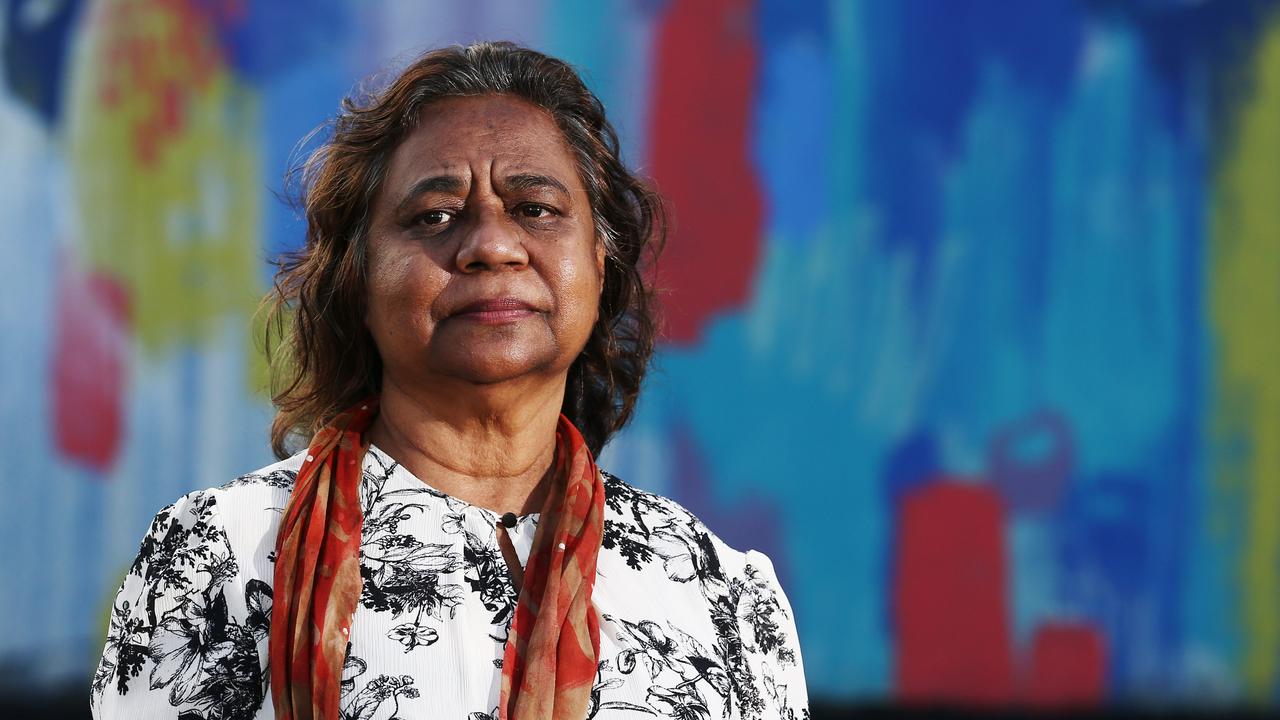‘Fluoride can get stuffed’: Cairns councillors vote on key public health issue
Cairns councillors have voted on the future of fluoride in the town’s water supply. HERE’S WHAT THEY SAID.
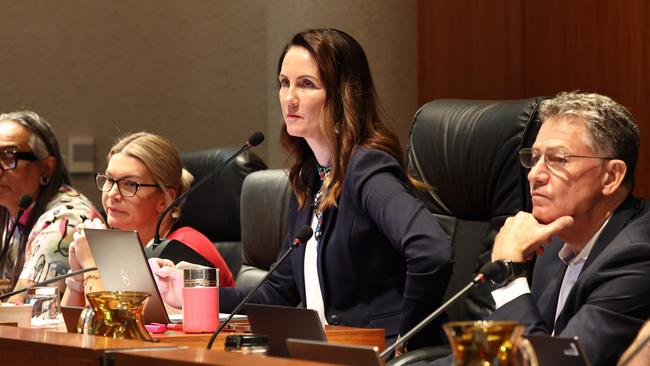
Cairns
Don't miss out on the headlines from Cairns. Followed categories will be added to My News.
The campaign against fluoride has succeeded, with Cairns Regional Council voting to stop the tooth-strengthening mineral from entering the city’s water supply at a rowdy ordinary meeting.
But anti-fluoride councillors were met with strong resistance, led by Division 7 councillor Anna Middleton, who attacked Mayor Amy Eden for refusing to meet with leading experts and using survey results to support her position.
In a blistering 12-minute address to councillors, Ms Middleton delivered a spirited argument in favour of the public health measure overwhelmingly recommended by doctors and dentists worldwide.
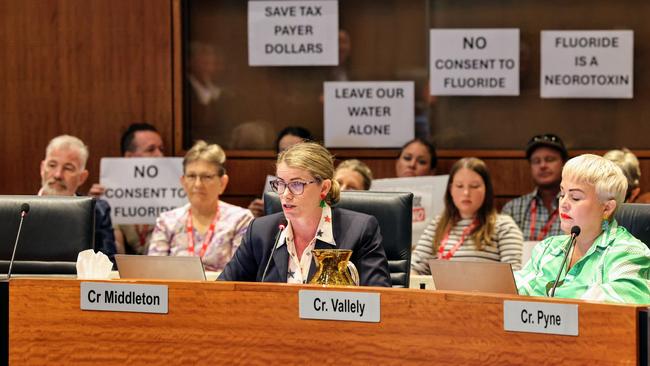
On multiple occasions, the packed public gallery jeered and insulted the first term councillor who questioned a council report recommending that the council keep the mineral, used to prevent tooth decay, out of its water supply.
“As a councillor, I feel like I have been more intently briefed on Ironman than I have on fluoridation of our water,” Ms Middleton said.
“It concerns me deeply that we are making this important decision that is directly affecting residents’ oral health outcomes on the basis of two community surveys.”
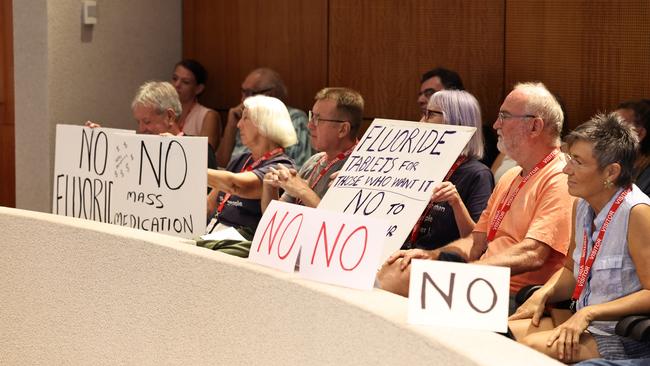
Fluoride, Ms Middleton argued, served as a safe, efficient and cost effective way to improve the overall health and standard of living for Cairns residents.
“We know that children without fluoridated water have 30-40 per cent more cavities,” she said.
“Townsville, with their fluoridated water, has significantly less primary tooth decay – 39 per cent to our 57 per cent.
“We are choosing to widen the health gap for all of our residents. This is a lifelong tragedy that we condemn our people to.
“We significantly disadvantage our residents’ health by remaining the only Australian city with a population of over 100,000 people that doesn’t supplement its water with fluoride.”
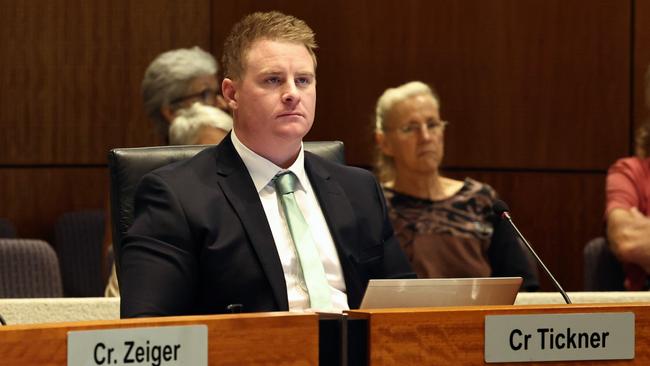
Division 2 councillor Matthew Tickner defended the council recommendation, reasoning that individuals must ultimately be responsible for their own health and wellbeing.
“Personal responsibility seems to be slipping through our collective fingers, replaced by a growing tendency to shift blame and rely on external solutions,” the southside councillor said.
“From ignoring the consequences of our actions, to expecting governments to solve problems for us. We are witnessing a cultural shift where accountability is often avoided.
“This erosion of responsibility weakens our social fabric, leaving communities less resilient and more dependent. Freedom of choice is the most important precursor to improved personal responsibility.”
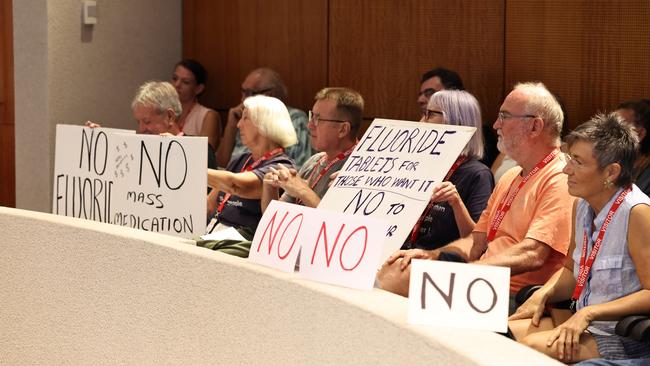
SURVEY CRITICISED
Pro-fluoride councillors also took Ms Eden to task on her use of the Our Cairns survey as a means to defend her public position on the issue.
“Should we take into account a survey that only represents six per cent of our community?” Ms Middleton said.
“Or, more importantly, question whether a survey is really the appropriate means to inform ourselves on this issue?”
Ms Middleton also questioned whether the survey reflected the best interests of children, people living in lower socioeconomic households, the disabled and First Nations peoples.
“I believe that if the survey had been directed at those most likely to be affected by poor oral health and the health professionals that provide their care, the results would have been significantly different,” she said.
“Advising these people to use mouthwash as part of a public health campaign shows a lack of insight into health literacy, capacity and, to be honest, a lack of compassion.”
But Ms Eden defended her consultation with the community and cited her teenage children’s relatively good oral health in her argument against fluoride.
“I’m comfortable with the decisions that my family made to make sure that our healthcare is catered for,” she said.
“I’m here as a mouthpiece and a representative for my community. I campaigned on speaking to my community and we have.
“I’ve copped a few bullets … (but) I don’t believe that fluoride in the water is the silver bullet that it’s claimed to be.”
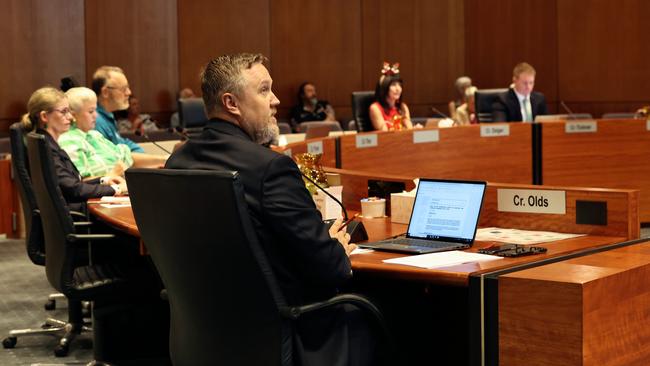
In support, deputy mayor Brett Olds took aim at the media for unspecified “personal attacks” on the mayor during the recent public debate on fluoride.
“I think you have been relentlessly attacked in the media, personally,” he said.
“You’ve honoured your word. You went through the election campaign as a candidate and fluoride came up.
“You put it to the community … and I don’t think it’s very fair the personal attacks on you.
“The people who don’t want fluoride are vehemently opposed to it. I don’t know how to look anyone in the eye and say, ‘Well, we know better than you’.
“I think it’s tyrannical and something I’m not comfortable with at all.”
Mr Olds urged pro-fluoride advocates to find other causes to support.
“There are vulnerable kids in our society … getting raped,” he said.
“If you’re trying to be noble and stand up for other people, why don’t you pick some other horses? We’ve got the highest rate of DV (domestic violence) in the country in this city.
“I really don’t think this is the unicorn dust that you think it is. Fluoride can get stuffed.”
Division 8 councillor, Rhonda Coghlan, didn’t attend the final ordinary meeting of the year.
Ms Eden, Mr Olds, and Mr Tickner, along with Division 1’s Brett Moller, Division 3’s Cathy Zeiger and Division 6’s Kristy Vallely all voted in favour of the recommendation to keep fluoride out of the city’s water.
Ms Middleton, Division 5’s Rob Pyne and Division 4’s Trevor Tim voted against the report.
COUNCILLORS ON FLUORIDE
Mayor Amy Eden
I’m comfortable with the decisions that my family made to make sure that our healthcare is catered for. I’m here as a mouthpiece and a representative for my community. I campaigned on speaking to my community and we have. Councillor Olds mentioned that I’ve copped a few bullets – and I have. I don’t believe that fluoride in the water is the silver bullet that it’s claimed to be.
Deputy mayor Brett Olds
I think you (Mayor Amy Eden) have been relentlessly attacked in the media, personally. You’ve honoured your word. You went through the election campaign as a candidate and fluoride came up.
You put it to the community … and I don’t think it’s very fair the personal attacks on you.
We’ve gone to our community twice now, in 2016 and 2024 and there’s no overwhelming support either for or against it.
The people who don’t want fluoride are vehemently opposed to it. I don’t know how to look anyone in the eye and say, ‘Well, we know better than you’.
I think it’s tyrannical and something I’m not comfortable with at all.
“There are vulnerable kids in our society … getting raped. If you’re trying to be noble and stand up for other people, why don’t you pick some other horses. We’ve got the highest rate of DV in the country in this city. I really don’t think this is the unicorn dust that you think it is. Fluoride can get stuffed.
Brett Moller (Division One)
Cairns Regional Council has no department or director for health. Our local government policy is that councils can decide (whether to fluoridate water or not). The legislative responsibility doesn’t say that we must mandate. It says that we must decide in consultation with our community. The new premier David Crisafulli has said that he will leave fluoridation to local government. If the state government, who are responsible for administering and leading public health are of a view that is not important enough to mandate fluoridation of the water supply … who are we as councillors without that expertise to override and implement fluoride?
Matthew Tickner (Division Two)
51 out of the 77 local councils in Queensland do not have fluoridated water. Our status quo position does not make us an outlier by any means.
Personal responsibility seems to be slipping through our collective fingers, replaced by a growing tendency to shift blame and rely on external solutions, from ignoring the consequences of our actions, to expecting governments to solve problems for us. We are witnessing a cultural shift where accountability is often avoided.
This erosion of responsibility weakens our social fabric, leaving communities less resilient and more dependent. Freedom of choice is the most important precursor to improved personal responsibility.
A patient always has the right to refuse treatment and medication, regardless of its potential health association. If that is the law that underpins your profession, then what justifiable reason do we as a local council have to take that choice away from our community?
Water should only be treated to the point that it is safe to consume.
Cathy Zeiger (Division Three)
We need to educate. I would have to see an overwhelming majority of our community say, ‘Cathy, we want that fluoride’. Then, I would go, ‘Look, I’m here to represent you. That’s what will happen.’ But you know what? That’s not what I’ve experienced so I will not be supporting it (water fluoridation).
Trevor Tim (Division Four)
I don’t support the recommendation. I’m thinking about closing the gap.
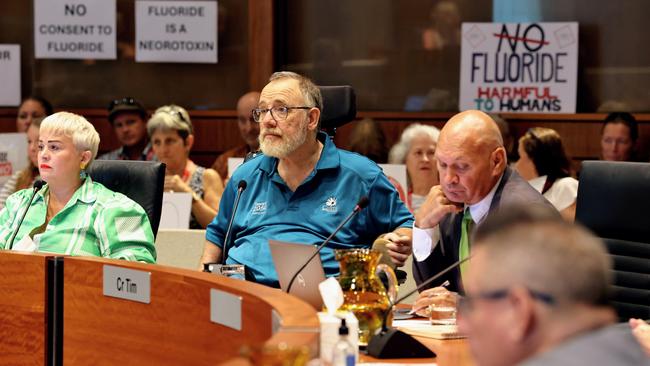
Rob Pyne (Division Five)
I’m not very impressed with the report. Water fluoridation is a core aspect of good oral health for any community. (It) is recognised globally as a top-tier intervention, offering lasting benefits. Far North Queensland is experiencing some of the worst dental outcomes in Australia, especially amongst our young people.
Kristy Vallely (Division Six)
I will be supporting the recommendation. I want to thank everyone who’s contacted us and given us the information. This is a very divisive issue but … it is very important that we rely on (the state government) for a recommendation in this area.
Anna Middleton (Division Seven)
I accept that supplementation of our water with fluoride is a public health measure. It is an unfair burden on local councillors. But the reality is that we sit here today with that legislative responsibility. Within the act we are prescribed to make a decision on fluoride that we believe is in the best interest of our whole community. By choosing to maintain the status quo, we are choosing an action of inaction. Choosing not even to investigate the fluoridation of our water supply, through engaging experts in the field, belies belief.
More Coverage
Originally published as ‘Fluoride can get stuffed’: Cairns councillors vote on key public health issue



